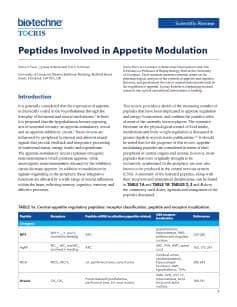Obesity Research
Obesity is a metabolic condition that is characterized by an excess of body fat to the extent that it has a detrimental effect on health. Humans are classified as obese when their body mass index (BMI, weight in kilograms / (height in meters)2) is greater than 30. Obesity increases the risk of many other diseases, including cardiovascular disease, diabetes, sleep apnoea, osteoarthritis and some cancers. It is a major cause of morbidity and mortality and prevalence of this condition is increasing.
To view Bio-Techne's complete solutions for lipid metabolism, glucose homeostasis, and energy balance, please visit our metabolism page on bio-techne.com
Obesity Research Product Areas
Causes of Obesity
The most common cause of obesity is a combination of low energy expenditure and high caloric intake. Environmental factors play a role in some cases and numerous susceptibility genes have been identified, including agouti-related peptide (AgRP) 199G - A polymorphism, FTO, NPC1, leptin, leptin receptors (Ob-R), and prohormone convertase-1. Certain psychiatric illnesses are associated with obesity, as are some genetic syndromes including Prader-Wili syndrome and MOMO syndrome. In addition, obesity can be secondary to other conditions such as hypothyroidism, Cushing's syndrome and growth hormone deficiency.
Many endogenous peptides effect appetite and hence have an influence on energy intake. Peripheral hormones effecting appetite include ghrelin, adiponectin, leptin, insulin, peptide YY (3-36), pancreatic polypeptide, glucagon-like peptide 1 (GLP-1), oxyntomodulin, amylin, cholecystokinin and bombesin. Other peptides act centrally to control appetite and these include neuropeptide Y, AgRP, melanocortin, orexin, galanin, α-melanocyte-stimulating hormone (α-MSH), cocaine and amphetamine-related transcript (CART) and neurotensin (NT).
Therapeutics
Treatment for obesity is focused on decreasing caloric intake and increasing energy expenditure. However, pharmacological interventions are available and include: orlistat, which inhibits pancreatic lipase to prevent uptake of fat from the diet; sibutramine, a serotonin-noradrenalin reuptake inhibitor (SNRI) that acts as an appetite suppressant; and rimonabant, a cannabinoid CB1 receptor inverse agonist. These drugs only have a modest effect on weight. Other drugs, such as bupropion, are used 'off label' for their appetite-suppressing effects.
Due to the prevalence and economic burden produced by obesity, novel pharmacological treatments are needed. Many are focusing on inhibiting the effects of orexigenic peptides and agonizing the effects of anorexigenic peptides to reduce appetite and subsequently reduce food intake. Current interest is focused on ghrelin receptor antagonists, peptide YY (3-36), GLP-1 analogs, amylin analogs and orexin 1 receptor (OX1) antagonists.
Literature for Obesity Research
Tocris offers the following scientific literature for Obesity Research to showcase our products. We invite you to request* or download your copy today!
*Please note that Tocris will only send literature to established scientific business / institute addresses.
Peptides Involved in Appetite Modulation Scientific Review
Written by Sonia Tucci, Lynsay Kobelis and Tim Kirkham, this review provides a synopsis of the increasing number of peptides that have been implicated in appetite regulation and energy homeostasis; putative roles of the major peptides are outlined and compounds available from Tocris are listed.
